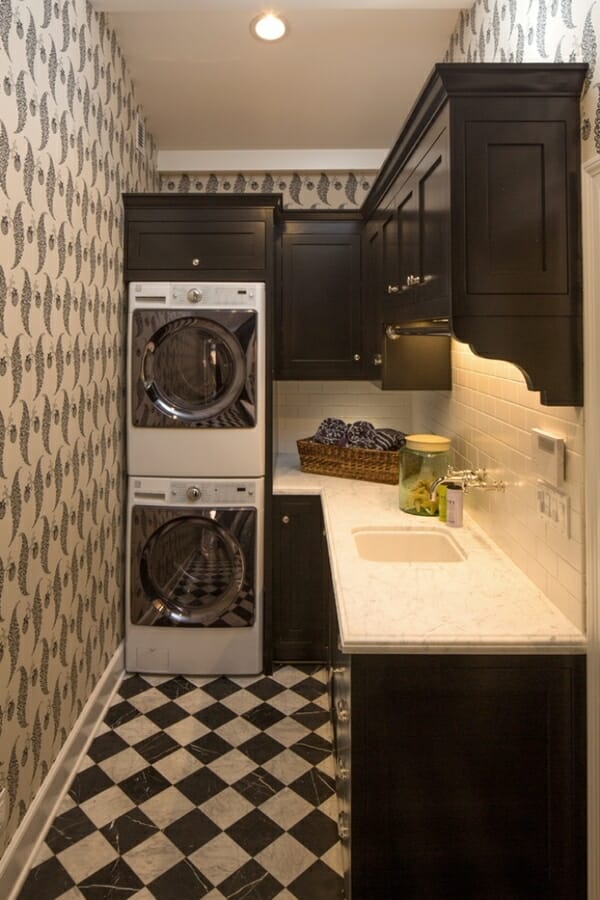What Is a Home Warranty?
In basic terms, a home warranty is a service contract that covers the cost to repair or replace your home’s major systems and appliances due to normal wear and tear. Buying a home is one of the largest investments most people make, and a home warranty is a common strategy to protect that investment from unexpected expenses.
Unlike a homeowners insurance policy, which covers damage from events like fire, storms, or theft, a home warranty steps in when your dishwasher leaks or your HVAC system stops working. These are everyday breakdowns that insurance typically won’t cover. Without a home warranty, repairs could cost hundreds or thousands of dollars out-of-pocket.
When you have a home warranty, all you need to do is submit a claim. Your provider will then dispatch a qualified service technician to diagnose the issue. For example, if your stove stops heating or the plumbing has a major leak, a home warranty could save you from high repair costs. That said, home warranties are not one-size-fits-all, and some homeowners may find better value in self-insuring.
The pros at Modernize are here to help you understand how home warranties work, what they cover, how much they cost, and how to choose the right provider for your home.

What Does a Home Warranty Cover?
Home warranties don’t cover everything, but plans can offer broad protection depending on the provider. Understanding the type of coverage you’re purchasing is crucial:
- Systems Plans: Cover major household systems like HVAC, electrical, and plumbing.
- Appliance Plans: Cover major appliances such as refrigerators, ovens, dishwashers, and washers/dryers.
- Combination Plans: Offer a blend of systems and appliance coverage.
Many providers also offer optional add-ons for items like swimming pools, well pumps, or a second fridge. Always review the fine print to confirm which items are covered and under what conditions.
Here’s a general overview of items that are and aren’t typically covered by a home warranty. It is important to check when reviewing a home warranty package to see if it covers systems, appliances or both, especially items that are important to you.
| Item | Covered by Home Warranty? |
|---|---|
| Washer and Dryer | Yes |
| Garbage Disposal | Yes |
| Sprinkler Systems | No |
| HVAC System | Yes |
| Window AC Unit | No |
| Plumbing System | Yes |
| Ornamental Fountains | No |
Excluded home warranty items typically include garage doors and tracks, windows, walls, doors, security systems, and aesthetic features. Additionally, coverage doesn’t usually apply to pre-existing conditions, damage due to poor maintenance, or improper installation. Some plans may not cover items like a refrigerator ice maker or a range’s self-clean function, even if the appliance is otherwise included.
Appliances or systems may also need to meet regular maintenance requirements or be installed by a licensed professional to qualify for coverage.
Frequently Asked Questions
Topics to Explore
How Much Does a Home Warranty Cost?
Typical home warranty plans range between $300 and $800 annually, depending on the provider, home size, and coverage type. Basic plans generally stay under $600, but costs increase with customized options, coverage for luxury appliances, or expanded service limits. Most providers also charge a service fee between $75 and $125 per claim, though some allow you to choose a higher fee in exchange for lower premiums.
Homeowners can opt for monthly payments, typically around $30 to $70 per month, although these might include administrative or processing fees. Premium plans with fewer exclusions and higher coverage limits can exceed $1,000 per year.
Costs also vary by region. For example, a home warranty in California or Florida — where HVAC systems run longer due to climate — may cost more than one in states with moderate weather like Oregon or Minnesota. Here is a rough snapshot of average annual costs by state:
| State | Avg. Annual Cost |
|---|---|
| Texas | $550 to $700 |
| California | $600 to $750 |
| Florida | $580 to $730 |
| New York | $500 to $650 |
| Ohio | $450 to $600 |
| Arizona | $550 to $700 |
To illustrate, imagine a homeowner in Texas with an older HVAC and kitchen appliances. A mid-tier plan with optional AC add-on might cost $675 per year, plus a $100 service fee per claim. In contrast, a new homeowner in Ohio with recently updated appliances could pay $475 annually with fewer likely claims.
Always consider your home’s age, system conditions, and local climate to get an accurate picture of the value a warranty provides.
Frequently Asked Questions
Topics to Explore
How Does a Home Warranty Work?
When a covered appliance or system breaks, you contact your home warranty provider and submit a claim. Most providers have online portals or customer service hotlines. Within 24 to 48 hours, they’ll assign a licensed service technician to diagnose the problem.
If the item is covered, the technician will repair or replace it. The homeowner pays a service fee (similar to a deductible), and the warranty provider covers the rest up to any coverage limits. Claims are usually resolved within a few days, though more complex issues can take longer.
Be aware that providers may deny claims for reasons such as improper maintenance or uncovered causes of failure. Carefully review your plan’s terms and conditions to avoid surprises.
Frequently Asked Questions
Do I Need a Home Warranty?
Having extra protections on your home is typically a great way to maximize your investment, but it doesn’t mean a home warranty is right for everyone. Every homeowner’s situation is unique, and they should consider several factors when deciding if a home warranty is their best option.

- How old is your home? If your home is new, the appliances and systems are likely still protected under a manufacturer’s or builder’s warranty, some of which offer years of coverage. But, if your home — or the appliances/systems in it — is older, then a home warranty might be a good option.
- Are you a first-time home buyer? Buying a home is a stressful process, especially if you’ve never done it before. Many first-time buyers see value in purchasing a home warranty during closing to prevent headaches later.
- Are you planning to sell your home? You might be wondering why you’d purchase a warranty plan if you’re looking to sell, but this added coverage can protect the hard work you put in before bringing the house to market. Plus, warranty plans can often be transferred to the new homeowners and entice potential buyers.
- Can you afford a home warranty? We’ll get into home warranty costs in a little bit, but just know that if you have some wiggle room in your budget, a home warranty might be an excellent way to avoid future financial stress.
Frequently Asked Questions
Topics to Explore
Questions to Ask Your Home Warranty Company
After comparing the costs and coverage limitations of a home warranty company, there are a few other questions every homeowner should ask when selecting a home warranty.
- Is a home inspection necessary? Some companies require a home inspection or maintenance records before a warranty can be purchased.
- Will there be a charge for repeat visits? If a problem persists, like an A/C that won’t stop leaking, will you be charged a service fee for each visit?
- What is the termination policy? Typically, a home warranty is a year-long contract, but many companies will allow you to cancel at any time. Ask your potential provider if they charge termination fees and how much they are, if applicable.
- What are the coverage limits? As discussed earlier, warranty providers will typically place coverage caps on services. It’s good to have an understanding of what these caps are.

Choosing the Best Home Warranty Company
With so many home warranty companies and plans available to homeowners today, it can be difficult to find the one that best suits your needs. Look for:
- Transparent Contracts
- Responsive Customer Service
- Fair Service Fees
- Nationwide Technician Network
- Customizable Plans
We recommend starting by comparing companies’ offerings. Look into their costs, including both monthly premiums and service request fees, plan coverage inclusions, coverage limitations and exclusions, response times, and service areas. Which of these factors are most important to you? Then, once you have prioritized what you want in a home warranty company, speak to 3 to 4 representatives on the phone to get a better feel for their customer service.
The experts at Modernize compiled this list of the 10 Best Home Warranty Companies to help homeowners narrow their search more easily.
Frequently Asked Questions
Is a Home Warranty Worth It?
A home warranty may be worth it for homeowners who value peace of mind and want to avoid large, unexpected repair bills. While not every plan will be worth the cost, they often prove valuable when multiple repairs are needed in a short period.
If you have newer appliances or strong DIY skills, you may prefer to set aside 1% of your home’s value each year as a repair fund. However, for many, the convenience and fixed costs of a warranty are well worth the investment.
Consider the Limitations
Like other types of warranties, there are coverage limits. Compare the cost of the warranty to the cost of the appliance(s) being covered in order to determine whether the policy is worth it to you or not.

Peace of Mind
For most, a home warranty can provide a financial buffer and peace of mind for the inevitable repairs that come with homeownership.

When dealing with appliance repairs, remember that out-of-pocket costs can rack up quickly, costing hundreds or even thousands of dollars in some instances. A home warranty safeguards this process. You simply make a claim and let your warranty provider deal with the bulk of it.
This is why for many, a home warranty is well worth the less than $1,000 annual cost. The policies and their ability to be customized are effective for long-term savings, preventing homeowners from having to dip into savings every time an appliance breaks down. However, other strategies might be more effective depending on your unique situation — such as setting aside about 1% of your home’s value each year for repairs.
What to Do After Getting a Home Warranty Policy?
Once you’ve purchased a home warranty policy, taking a few simple but important steps can help ensure you get the most from your coverage. Familiarizing yourself with your plan’s details and preparing documentation in advance can make a big difference when it’s time to file a claim. From setting up your account to tracking maintenance, these proactive measures will help you stay organized and maximize your benefits.
- Review your contract thoroughly to understand coverage and exclusions.
- Set up your online account or customer portal.
- Schedule any necessary inspections if required.
- Keep receipts and records of maintenance for covered items.
- Save your provider’s contact info for quick access.
- Inform household members how to file a claim.
Frequently Asked Questions
Ready to get your project started?
Let us find the best Home Warranty pros in your area, then easily request quotes, book a contractor, and get the job done. It's that easy.

Homeowner Resources
Here are the top articles that homeowners found useful when planning their Home Warranty project and navigating the contractor hiring process.

Real Stories, Real Success
See how our solutions empower homeowner projects and experiences.
